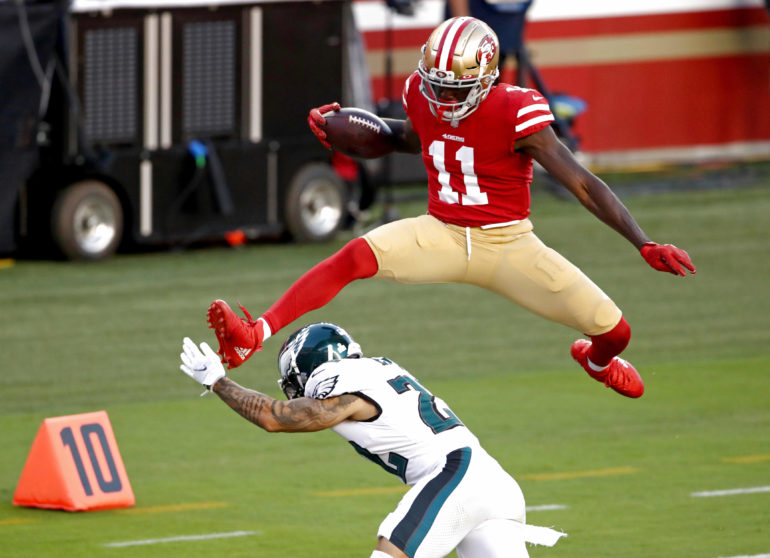The National Football League is Thelma. American media is Louise. The new 11-year rights deal is the cliff.
The NFL and the largest traditional U.S. media companies — Disney, Comcast’s NBCUniversal, ViacomCBS and Fox — signed a long-term agreement Thursday. The four traditional U.S. media companies will pay the NFL $9 billion each year until 2033. Amazon will pay the league an additional $1 billion a year for Thursday Night. While the NFL does have an opt-out clause after seven years, the message is clear: This is a long-term marriage.
In the past, NFL rights renewals have been newsy for their eye-popping prices. The NFL is routinely the most watched programming on American television, and American television has been a fixture in people’s lives for many decades. Both sides knew what they were getting. The league would earn billions of dollars, and the TV networks would also take in billions of dollars from advertising and pay-TV subscriptions. Meanwhile, U.S. consumers would pay higher cable bills, regardless of whether they watched a single football game.
This contract is different. In five years, neither the NFL nor the media companies that signed the deal have a great grasp on how many people will still be watching, if they’ll be watching via cable or streaming, or even if the media companies will still be the same independent companies they are today.
The details of the agreement hammered this point home. Disney has the right to simulcast all ESPN and ABC games on ESPN+, starting in 2023. NBCUniversal will make Sunday Night Football — almost always the week’s most highly-rated TV show — on Peacock. ViacomCBS will continue to show games on Paramount+. Fox’s free service, Tubi, will now include football programming.
The only thing that seems certain is the price of your cable bill — and possibly your favorite streaming service — will be going up. If media companies pay a lot more for the same content, you can bet you’ll be paying for it.
“It’s not a mystery paid television has been losing subscribers for some time now,” said Brian Rolapp, Chief Media and Business Officer of the NFL, in a CNBC interview. “But as you see in these deals, we are encouraging [our media partners] to build their reach. We’re ultimately a sport that’s built on reach. By enabling our partners to have more digital rights…we think we’re going to increase that reach.”
The combination of rising cable bills plus making NFL games available on streaming services should accelerate the demise of traditional pay-TV. LightShed analyst Rich Greenfield wrote in a note to clients that “March 18, 2021 is the day the multichannel TV bundle died.”
Concerningly, TV ratings for live events — NFL included — are trending down, even when streaming is accounted for. Super Bowl ratings for the 18-to-49 demographic have been declining for a decade. Americans have more entertainment options than ever — and it’s unclear if sports TV ratings will ever bounce back, especially if the NFL fails to be the same cultural touchstone for younger people it has been.
“In this day and age, you’ve got one parent watching sports in one room, another watching something different in a different room, and kids on their own devices in their rooms,” said Vince Wladika, a former NBC Sports, FOX Sports & Major League Baseball executive. “Kids learn to be sports fans from their parents. If kids aren’t brought up watching sports with their parents, that shared experience dies off.”
If the cable bundle collapses, Americans won’t have to shell out $20, $30 or $40 a month for sports they’re not watching as part of a standard cable bundle. Instead, they’ll have the option to pick and choose streaming services. That may leave the NFL will fewer eyeballs.
Meanwhile, the networks paid enormous increases over their previous rights deals for NFL games, showcasing how desperate they remain for must-see content to differentiate themselves from Netflix and other entertainment services.
That could be a recipe financial disaster for media companies as the NFL contract ages. In addition, some of the media companies who bought rights may merge in the years to come, potentially consolidating the rights within the same company or companies.
But what other choice did Disney, NBCUniversal, ViacomCBS and Fox really have? The NFL is the biggest game in town. If you can’t bank on football, you can’t bank on anything. Investors are suddenly valuing media companies at higher trading multiples. Pushing streaming growth forward with the NFL is necessary to maintain valuation momentum.
Take the wheel and hold my hand, Louise. We’re hitting the gas.



